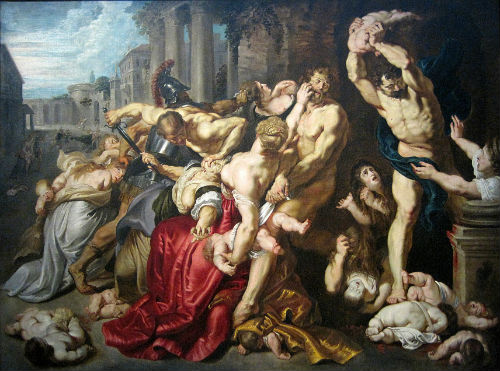 Amazing but true – shepherds still work in Bethlehem.
Amazing but true – shepherds still work in Bethlehem.By Neil Earle
Tucked away in quiet dignity near the heart of the majestic Book of Romans lies what I like to call Paul’s Christmas Message.
Huh? But St. Paul never knew about Christmas” do I hear you say? True. It was not celebrated as a Christian festival until three centuries after he died.
But the Gospel writers Matthew and Luke have a Christmas message – sometimes called the Birth or Infancy Narratives. Queen Elizabeth will have hers. No doubt the President will too in some form. I know the Prime Minister of Canada will. So why shouldn’t St. Paul?
 Amazing but true – shepherds still work in Bethlehem.
Amazing but true – shepherds still work in Bethlehem.I don’t know if Paul would have approved of Christmas – especially the gaudy and sentimental way we too often celebrate it today. But I bet he would have taken advantage of it, contagious Gospel communicator that he was. He might well have used this season as a platform or jumping off spot to explain more of the deeper purposes of God. He’s the missionary-minded apostle who wrote that even if the Gospel were preached in a spirit of rancor he would have rejoiced (Philippians 1:15-18).
Great promoter that he was, Paul would have noticed phrases such as “peace on earth,” “glory to God in the highest” and “O little town of Bethlehem” ringing in our ears this time of year. He knew it set people up to be a little more receptive to the Gospel. “Take advantage of every opportunity” he once wrote (Ephesians 5:15-16 NIV).
So… I don’t think he would mind too much if I nominate Romans 5:12-21 as St. Paul’s Christmas message.
Just look at Romans 5:1 for openers:
“Therefore, since we have been justified through faith, we have peace with God through our Lord Jesus Christ, through whom we have gained access by faith into this grace in which we now stand. And we rejoice in hope of the glory of God.”
“Peace with God” – marvelous phrase. It’s a Christmas standard. “Gained access” – that was God’s purpose in the Jewish tabernacle of old and can, without much trouble, fit the message being sung this season – “O Come, all ye faithful,” “God with us” and my personal favorite, “O Come, O Come, Immanuel.” Then there is the line from “Angels We Have Heard on High” that read: “Come to Bethlehem and see/ Him whose birth the angels sing.”
 Mighty Caesar was but a tool to get things moving towards Bethlehem.
Mighty Caesar was but a tool to get things moving towards Bethlehem.These stout old songs say nothing about reindeer or stockings hung by the chimney with care. They rather underscore a great Gospel truth. Israel in Jesus’ time felt it was still living in bondage, that the nation had really not atoned for the sins that led to the Babylonian Captivity. Hence the heavy jackboot of Roman oppression was still on them. (See N.T. Wright, The Climax of the Covenant, page 141.)
Now here comes news of this little baby born in Bethlehem (Matthew 2:1-3). Jesus – the real purpose for Israel’s existence, the One who personifies “the tender mercy of our God, by which the rising sun will come to us from heaven to shine in those living in darkness and in the shadow of death, to guide our feet into the path of peace” (Luke 1:78).
Peace – irene in the Greek – was one of Paul’s favorite words. As we know, it means more than the absence of war – though that is a comforting enough thought for an age of terror and school shootings. It means a bathing of our hearts and minds in the saving oil of God’s Holy Spirit, the Spirit of Peace. It means good will towards all men, women and children we meet.
Wouldn’t we all at some point like to experience just a little taste of the glory of God? Well some rugged outcast shepherds had that blessing. They caught a vision of angels hovering majestically over Bethlehem. The angel’s message was grrrreat – “Do not be afraid. I bring you good news of great joy that will be for all the people” (Luke 2:10). How extraordinary this all was. Here were men barred from participation in the Temple rites just up the road the first to have access to the Hope of Israel. They responded in kind and became among the first proclaimers of the Gospel – the good news! Those very shepherds “returned, glorifying and praising God for all the things they had heard and seen” (Luke 2:20).
Back to Paul and Romans 5.
He is never shy to enunciate how important the life of Christ is to every believer. “For if, when we were God’s enemies, we were reconciled to him through the death of his Son, how much more, having been reconciled, shall we be saved through his life!”
Exclamation point, indeed. If Paul were here today, Gospel opportunist that he was, he might point out that the One we worship as the Lord Jesus Christ identified as “the Dayspring from on high” (Luke 1:78 NAV) began life as a little baby in Bethlehem.
There’s an echo of that in a Christmas hymn we all know that goes “man shall live forever/because of Christmas day.” Such kinder, gentler openings to explore the Gospel with other people are rife this time of year. Late December in the Western world focuses on the Light of the world “tabernacling” among us. God did not so much surrender his divinity by becoming the child of Bethlehem as much as he took on our humanity. By so doing he ennobled all of us, we who by nature are sinners (Ephesians 2:12). This should make us exult like Paul in Romans 5: “We also rejoice in God through our Lord Jesus Christ, through whom we have now received reconciliation.”
Access. Peace with God. Reconciliation. Rejoicing. These are all emotional incentives to spiritually luxuriate in at every season of the year. But how much more at Christmas time when people are surrounded with Gospel hints and cues at every turn. Angles in the malls, wise men peeking behind the window displays, nativity scenes in many town centers. These provide prime opportunities to be a little bolder about the basic truths of the Gospel, of Christ’s first Advent, of his coming to be our atonement, to bear our sins and to make access possible to the Father.
The great teacher C.K. Barrett remarked some time ago that Paul is also the patron saint of Thought, of the Intellect, in Christianity. A smug, sentimental, “I’ve got mine” anti-intellectual Gospel had no place in Paul’s theology. Paul was a “thinking man’s Christian” who could both formulate and express a deeply-felt cosmic concern for the plight of our hurting war-obsessed child-killing world. The Paul who said he would gladly trade his salvation if it would convert a fellow Israelite (Romans 9:1-5) was no gushy sentimentalist.
So, in Romans 5:12-21 Paul sketched out his deep awareness of what the coming of Jesus Christ, his advent, had meant for the world. It meant nothing less than removing the curse of the spiritual contagion caused by Adam’s sin. The stakes at Bethlehem were thus high indeed.
 Herod's dastardly act recorded in Matthew 2 has stirred many artistic protests – this by Reubens.
Herod's dastardly act recorded in Matthew 2 has stirred many artistic protests – this by Reubens.Here’s the way Paul put it, in condensed summary: “Therefore just as sin entered the world through one man, and death through sin…how much more did God’s grace and the gift that came by the grace of the one man, Jesus Christ, overflow to the many” (Romans 5:12-15).
“Death through sin” – why, that’s are the stuff of our morning papers and nightly news reports. Sadly. Paul knew this would be our lot. But he also painted the answer – the gift from God of his one and only son, Jesus Christ. Jesus coming into this dark and dreary world to offer…what exactly? Let’s read the answer in this marvelous thumbnail commentary on the bad news of the world today:
“For, if, by the trespass of the one man, death reigned through that one man, how much more” – key words here in the argument – “how much more will those who receive God’s abundant provision of grace and of the gift of righteousness reign in life through the one man, Jesus Christ.”
The child of Bethlehem would grow up to carry “the hopes and fears/of all the years.” No wonder Matthew and Luke spend so much time on the Birth Narratives and explain why Jesus’ first advent met such resistance! The power centers of this world were deeply worried. Blinded ruthless King Herod struck out viciously. Herod plotted the Slaughter of the Innocents and those parents still tragically grieving over the Sandy Hook School massacre in Connecticut can relate too much to the voice of lament being heard in Bethlehem that first Christmas (Mathew 2:16-18).
The dark forces behind the scenes in this world (Ephesians 6:12), they knew well what was at stake in Bethlehem. Eternal life, that was the prize. Giving us access to eternal life was Jesus’ reason for being (John 17:2). “And man shall live forevermore/because of Christmas Day.” What a hope. What a blessing. What a gift!
Let’s read Paul’s upbeat conclusion: “The law was added so that the trespass might increase. But where sin increased, grace increased all the more, so that, just as sin reigned in death, so also grace might reign through righteousness.” To what purpose? “To bring eternal life through Jesus Christ our Lord.”
Remember the words of the carol? “Born to save the sons of earth/Born to give them second birth.”
It seems to me that Romans 5 – linked with the basic themes of Christmas – affords a good reason to celebrate this time of peace and rejoicing in a deeper, more intellectually satisfying way. Or as Paul said elsewhere: “The important thing is that in every way, whether from false motives or true, Christ is preached. And because of this I rejoice!” (Philippians 1:15-18).
My feelings, exactly.